

2000Huber. True Freedom Comes With Basic Income – Basic income. “I can’t not do this, because I need the money…” — The thought underlying all exploitation which can be eliminated with one BIG idea I attended a national economic conference in New York in 2015, and in one of the presentations, the speaker presented the following claim: human trafficking is not so much a criminal issue as it is an economic vulnerability issue, and therefore the best tool we have to strike at the very root of the problem, is a universal basic income.
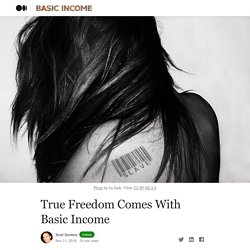
This idea of a basic income guarantee — an amount of money given to all without any conditions aside from mostly citizenship (and perhaps age) — is an idea that has been around for centuries and yet only recently is really starting to noticeably catch fire in the minds of the public at large. It is being referred to in such terms as “an idea whose time has come”, “an end to poverty”, and “venture capital for the people.” Robert Reich (Labor Day 2028) Why do big corporations continue to win while workers get shafted?
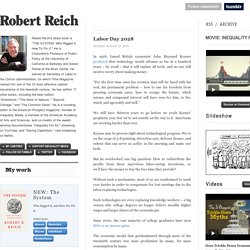
It all comes down to power: who has it, and who doesn’t. Big corporations have become so dominant that workers and consumers have fewer options and have to accept the wages and prices these giant corporations offer. This has become even worse now that thousands of small businesses have had to close as a result of the pandemic, while mammoth corporations are being bailed out. At the same time, worker bargaining power has declined as fewer workers are unionized and technologies have made outsourcing easy, allowing corporations to get the labor they need for cheap. These two changes in bargaining power didn’t happen by accident. Why we should all have a basic income.
Human Park: A Mammal’s Guide to Stress-Free Living – Basic income. (An alternate version of this article was originally published in the Fall 2016 50th Anniversary issue of XY Magazine and available at Barnes & Noble) At the end of 2015, after a year-long journey, I achieved the realization of an idea with the help of about 140 people that has already forever changed the way I look at the very foundations — or lack thereof — upon which all of society is based.

I now firmly believe we have the potential through its universal adoption to systemically transform society for the better, even more so than many of those most familiar with the idea have long postulated, because for me, the idea is no longer just an idea. It’s not theory. OPINION: Facebook’s Purchase of Oculus is the New Best Example of 21st Century Inequality and the Need for Unconditional Basic Income. The purchase of Oculus by Facebook for $2 billion is the new best example of the growing inequality inherent in 21st century capitalism – what Paul Mason describes as the The Fourth Wave.
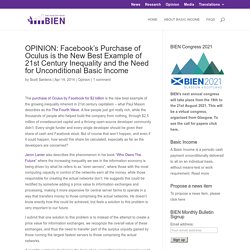
A few people just got really rich, while the thousands of people who helped build the company from nothing, through $2.5 million of crowdsourced capital and a thriving open-source developer community didn’t. Every single funder and every single developer should be given their share of cash and Facebook stock. Technological Inheritance and the Case for a Basic Income. The conventional fear that instituting a basic income will lead to a significant drop in work and productivity has also been challenged by modern research.
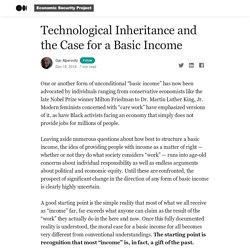
Between 1974 and 1979 the Canadian government tested a basic income plan in the small town of Dauphin, Manitoba. A subsequent study found that during the trial period hospitalizations dropped 8.5 percent compared to a control group, high school completion rates increased (especially for boys in low income families), women spent more time with new born babies, and, importantly for people worried about the effect a basic income would have on work and productivity, there was minimal impact on the number of hours people worked.
While it may nonetheless be argued that everyone should contribute something to the community from which she takes something, the question of a income free of means testing or a work requirement also appears in a different light when considered in historical and especially technological perspective. India weighs up the return on cash handouts for the poorest. “No power on earth can stop an idea whose time has come,” the former Indian prime minister Manmohan Singh famously said in 1991, alluding to Victor Hugo, as he announced the market reforms that are credited with improving the lives of hundreds of millions of Indians.

Last week, India’s chief economic adviser used the same language to laud a policy that promises to shrink poverty rates even further. A universal basic income (UBI) – in its simplest form, the idea of paying every citizen a no-strings wage – was also “an idea whose time has come”, said Arvind Subramanian. Although in this case, innovation came with a caveat, Subramanian adding: “Perhaps not for immediate implementation, but at least for serious discussion.” India is not alone in considering such a major rethink in the relationship between citizens and the economy. In January, Finland launched a trial programme to pay some unemployed Finns a guaranteed sum of €560 (£480) a month – even if they went on to find work.
Ontario is the latest place to experiment with basic income. Blair Gable/Reuters Finland, the Netherlands, and San Francisco, California, have already shown interest in giving people a regular monthly allowance — a system known as basic income.

Now Ontario, Canada, is planning a basic-income trial as well. On Monday, Premier Kathleen Wynne outlined new details of the Ontario Basic Income Pilot, which is expected to begin later this spring and last for three years. Inequality and the Basic Income Guarantee – Basic income. The efficiency of cash transfer programs is also widely known among economists.
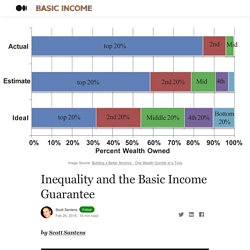
According to the chairman of the economics department at Harvard University, as far as policy propositions with greatest consensus among professional economists go, 84% are in agreement that cash payments increase the welfare of recipients to a greater degree than do transfers-in-kind of equal cash value. And yet case after case of the economic efficiency of cash transfers somehow continues to surprise or confound the public at large, as people continue to insist instead on transfers in-kind and attached conditions despite the evidence of observed human behavior where cash is given with no conditions.
This continuing misinformation trend seems likely related to media bias and long perpetuated myths by those looking to exploit popular assumptions for their own gain. There is one idea however, that although not new in itself, is rapidly experiencing a renaissance of renewed interest. Universal Basic Income and Marginal Rates – The Surly Subgroup. By: Benjamin M.
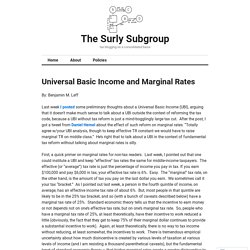
Leff Last week I posted some preliminary thoughts about a Universal Basic Income (UBI), arguing that it doesn’t make much sense to talk about a UBI outside the context of reforming the tax code, because a UBI without tax reform is just a mind-bogglingly large tax cut. After the post, I got a tweet from Daniel Hemel about the effect of such reform on marginal rates: “Totally agree w/your UBI analysis, though to keep effective TR constant we would have to raise marginal TR on middle class.” He’s right that to talk about a UBI in the context of fundamental tax reform without talking about marginal rates is silly. Post-autistic economics. The post-autistic economics movement (French: autisme-économie)[1] or movement of students for the reform of economics teaching (French: mouvement des étudiants pour une réforme de l'enseignement de l'économie)[2] is a political movement which criticises neoclassical economics and advocates for pluralism in economics.
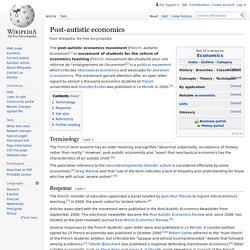
The movement gained attention after an open letter signed by almost a thousand economics students at French universities and Grandes Écoles was published in Le Monde in 2000.[3] Terminology[edit] The French term autisme has an older meaning and signifies "abnormal subjectivity, acceptance of fantasy rather than reality". However, post-autistic economists also "assert that neoclassical economics has the characteristics of an autistic child".[4] Response[edit] Happiness economics. The field has grown substantially since the late 20th century, for example by the development of methods, surveys and indices to measure happiness and related concepts,[2] as well as quality of life.
Happiness findings have been described as a challenge to the theory and practice of economics.[3] Nevertheless, furthering gross national happiness, as well as a specified Index to measure it, has been adopted explicitly in the Constitution of Bhutan in 2008, to guide its (economic) government. Subject classifications[edit] The subject may be categorized in various ways, depending on specificity, intersection, and cross-classification. For example, within the Journal of Economic Literature classification codes, it has been categorized under: Metrology[edit] Humanistic economics. Humanistic economics is a distinct pattern of economic thought with old historical roots that have been more recently invigorated by E. F. Schumacher's Small Is Beautiful: Economics as if People Mattered (1973).
Proponents argue for "persons-first" economic theories as opposed to mainstream economic theories which are understood as often emphasizing financial gain over human well-being. Homo economicus. This article is about the economic concept. For the journal, see Homo Oeconomicus. In economics, homo economicus, or economic human, is the concept in many economic theories of humans as rational and narrowly self-interested actors who have the ability to make judgments toward their subjectively defined ends. Using these rational assessments, homo economicus attempts to maximize utility as a consumer and economic profit as a producer.[1] This theory stands in contrast to the concept of e.g. homo reciprocans, which states that human beings are primarily motivated by the desire to be cooperative and to improve their environment.
History of the term[edit] Homo reciprocans. Homo reciprocans, or reciprocal human, is the concept in some economic theories of humans as cooperative actors who are motivated by improving their environment. This concept stands in contrast to the idea of homo economicus, which states the opposite theory that human beings are exclusively motivated by self-interest. Kropotkin[edit] Russian theorist Peter Kropotkin wrote about the concept of "mutual aid" in the early part of the 20th century.
Reviewery. Wages For Facebook? Maybe It's Not So Crazy – Falkvinge on Liberty. On the one hand, the “Wages for Facebook” manifesto currently sweeping the web was never meant to be taken literally. The idea that a free social networking service should pay its users for their “labor” is, at face value, ridiculous. But underneath the sensational language, there’s something to this notion of Facebook as an exploiter. The premise of the boisterous, all-caps manifesto is laid out in its first paragraph: Well then.
If Facebook makes billions from my data, I deserve the basic income as a dividend for my work. 15-hour weeks, basic income and doughnuts. Are these the big ideas that could end inequality? Pay Zines. The Universal Right to Capital Income by Yanis Varoufakis. Human History. Presumptive Wealth. World Worx. Worldly Info.